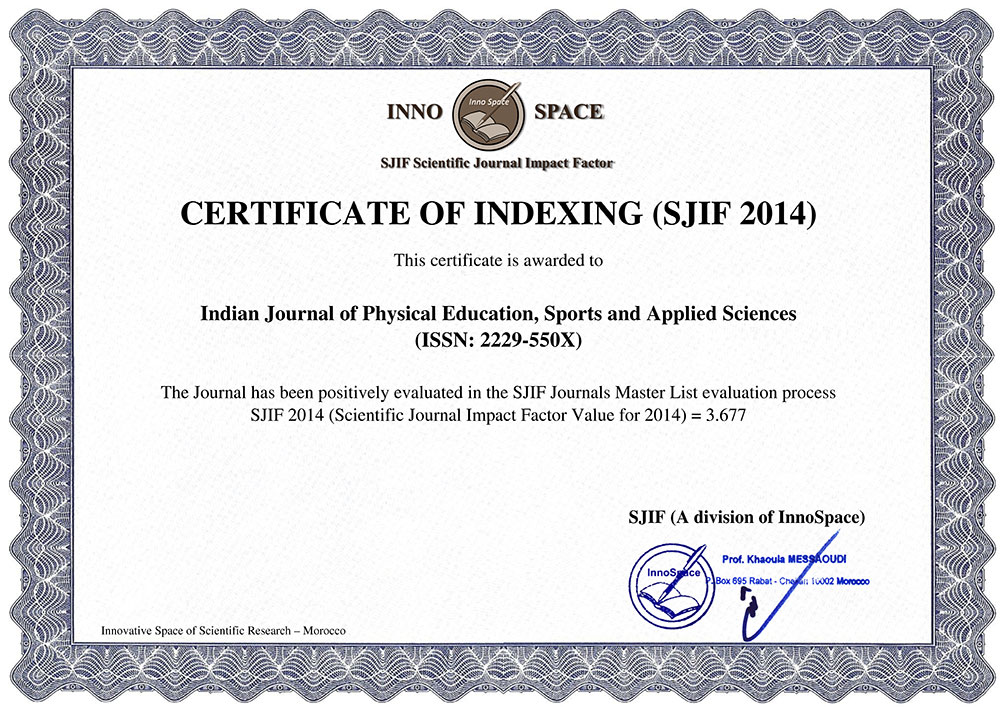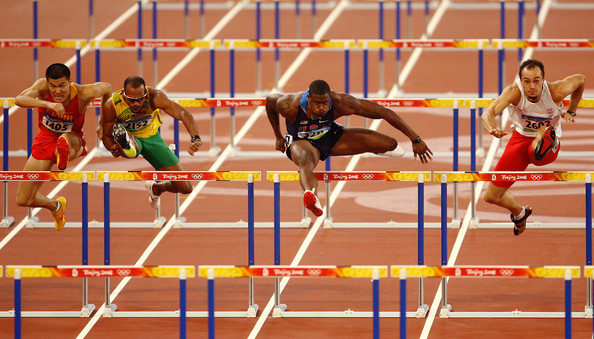EFFECT OF YOGIC PRACTICES ON EMOTIONAL AND MENTAL ENHANCEMENT OF SPORTSPERSONS: AN EXPERIMENTAL STUDY
Volume 7-Number 2, April, 2017 May 15, 2017| Author name : | Kapil Kumar Sahu & Dr. Sudhir Rajpal | ||||
|---|---|---|---|---|---|
| Page no : | 31-34 | Volume : | 7 | Issue : | 2 |
doi no.:05.2017-48993486 DOI Link ::http://doi-ds.org/doilink/05.2017-48993486/
Kapil Kumar Sahu1 & Dr. Sudhir Rajpal2
Affiliations:
1 M.Phil. Student, Department of Physical Education, Dr. C.V. Raman University, Kota Bilaspur C.G.
2 Assistant Professor, Department of Physical Education, Dr. C.V. Raman University, Kota Bilaspur C.G.
ABSTRACT
In the present study effect of one month yogic exercise program was observed on positive mental health of male sports persons. To conduct the study 100 intercollegiate male sports persons (Average age 21.32 years) from the state of Uttarakhand were selected as sample. The selected male sports persons were divided equally into experimental and control group. 50 male sports persons from experimental group took part in one month yoga program while subjects of control group did not take part in this program. To assess positive mental health of selected male sports persons just prior to commencement of study period and after completion of study period, Positive Mental Health Inventory prepared by Agashe and Helode (2007) were used. Result reveal that after taking part in one month yogic exercise program, the positive mental health of male sports persons enhanced significantly while no significant change was observed in positive mental health of male sports persons belonging to control group. It was concluded that one month yogic exercise program is beneficial for strengthening the positive mental health of male sports persons.
Keywords : Positive mental health, male sports persons, yoga
DOWNLOAD FULL TEXT: 
BIBLIOGRAPHY
Agashe, C.D. and Helode, R.D. (2007). Positive Mental Health Inventory, Psychoscan, Wardha (MS).
Baldwin, M. C (1999). Psychological and physiological influences of Hatha Yoga training on healthy, exercising adults. (yoga, stress, wellness). Dissertation Abstracts International Section A: Humanities and Social Sciences 60, 1031.
Carrington, P., Collings, G.H., Benson, H., Robinson, H., Wood, L.W., Lehrer, P.M., Woolfolk, R.L. and Cole, J.W. (1980). The use of meditation-relaxation techniques for the management of stress in a working population. Journal Occupational Medicine. 22(4):221-31.
Chaplin, J.P. (1975) : Dictionary of Psychology (Rev. ed.), D.P., New York.
Deshpande, S., Nagendra, H.R. and Raghuram, N. (2008). A randomized control trial of the effect of yoga on verbal aggressiveness in normal healthy volunteers. Int J Yoga, 1(2):76-82.
Knobben, S. (2013). A meta-analysis of the effectiveness of yoga on mental health; taking on a dual perspective reflecting the medical and positive perspective of mental health. Master’s Thesis, University of Twente, the Netherlands, Faculty of Behavioral sciences and Psychology.
Meninger, K.A. (1930): The human mind. Alfred A. Knopf, New York.
Strupp, H.H. and Hadley, S.W. (1977): A tripartite model of health and therapeutic outcome. American Psychologists, Vol. 32, No. 3.
Swatmarama. commentary by Swami Muktibodhananda. 3 rd ed. Hatha Yoga Pradipika, Munger, India: Yoga Publications Trust; 1998. p. 150.
Tiwari, P.K. and Agashe, C.D. A Comparative Study of Positive Mental Health among Kho-Kho Players with Varying Level of Sports Achievements. International Journal of Science and Research (IJSR) ISSN (Online): 2319-7064.
World health organization (2001). The world health report. Health system: Geneva, Life style for Health, fitness, and Wellness.p:76.







